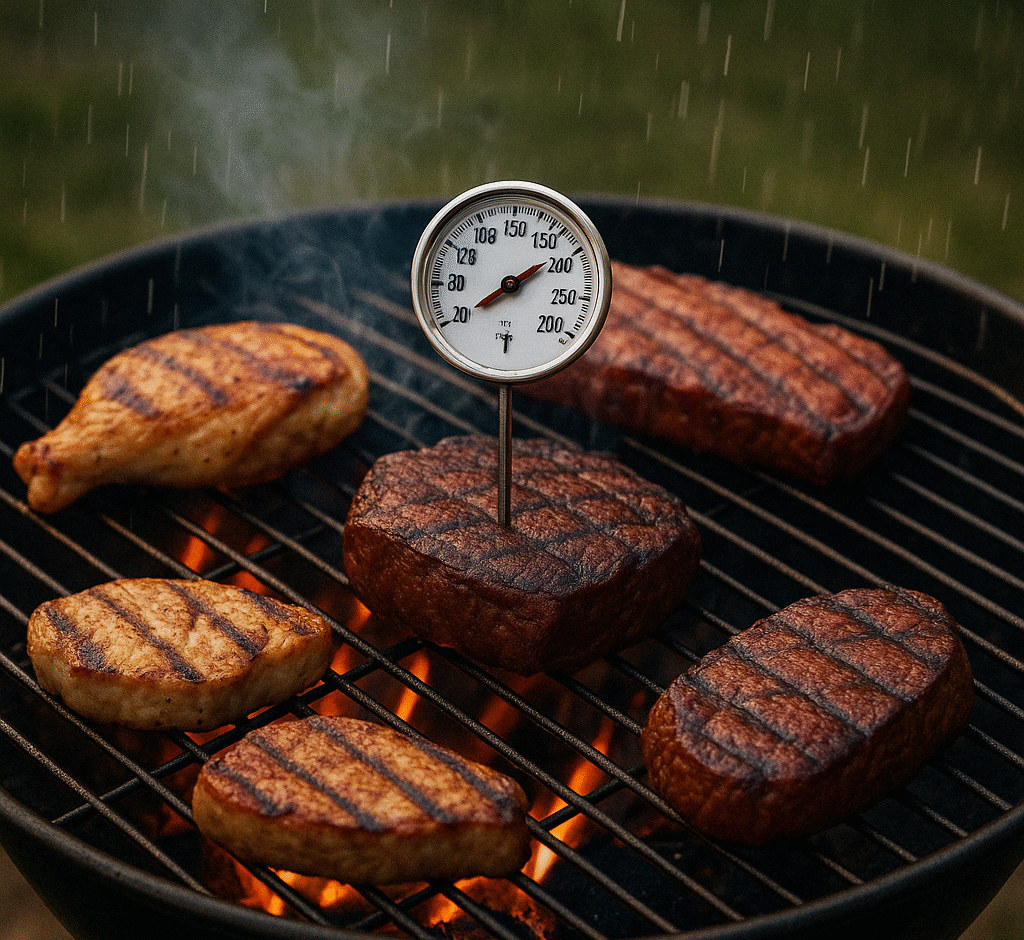
Wind, rain, snow, and even humidity can all mess with your grill temps. Learn how weather impacts your BBQ — and how to adjust for perfect results in any condition.
It’s Not Just About Fire and Meat
You’ve dialed in your smoker. You’ve got the perfect cut. But then the wind kicks up, or the temps drop, and suddenly your cook isn’t going as planned. That’s because weather matters — a lot. Understanding how the elements affect your grill or smoker gives you an edge when things don’t go exactly by the book.
Let’s break down what really happens when Mother Nature gets involved.
Temperature Outside = Temperature Inside (Sort of)
Outdoor ambient temperature can have a big effect on how your grill or smoker performs — especially if you’re cooking low and slow.
Cold Weather Challenges:
- Takes longer to preheat
- Burns through more fuel
- Lowers cook chamber temp faster when you open the lid
Tip: Use insulation blankets or fire bricks to maintain steady temps.
Wind: The Silent Temp Killer
Wind doesn’t just cool things down — it messes with airflow. On charcoal grills and offset smokers, that’s a major factor.
- Too much wind? Fires burn hotter, temp control becomes tricky.
- Wrong wind direction? Smoke gets blown away or unevenly drawn.
Tip: Position your grill with vents shielded from strong winds or use windbreaks like plywood or metal panels.
Rain and Humidity
Rain cools the grill surface and can reduce your chamber temp — especially if you’re using a metal smoker. Meanwhile, high humidity slows evaporation, which can actually help keep meat moist.
- Rain = lower grill temps, longer cook time
- High humidity = longer stall, juicier bark
Tip: Use a canopy or smokehouse-style setup to keep your gear dry.
Hot Weather BBQ
High temps outside can speed up your cook — sometimes too fast. When it’s already 90°F out, your smoker needs less fuel to hold temp, and your meat may finish sooner than expected.
Tip: Monitor your cook more closely and don’t assume it’ll take the full time.
Altitude Also Matters
At higher altitudes:
- Water boils at a lower temp
- Moisture evaporates faster
- Cooking times may increase slightly
It’s subtle, but worth adjusting for if you’re smoking meat in the mountains.
Final Tips to Stay in Control
- Use a dual-probe thermometer: Monitor both meat and chamber temps
- Keep the lid closed: Every time you peek, you drop 10–30 degrees
- Have extra fuel ready: Cold or windy cooks burn through charcoal faster
- Take notes: Track how weather affects your cooks and adjust next time
Final Thoughts
BBQ is about more than just meat and flame — it’s about control, and that includes working with (or against) the weather. Understanding how outdoor conditions impact your cook lets you adapt like a pitmaster, no matter the forecast.
So rain or shine, wind or snow — you’re ready to bring the heat.
